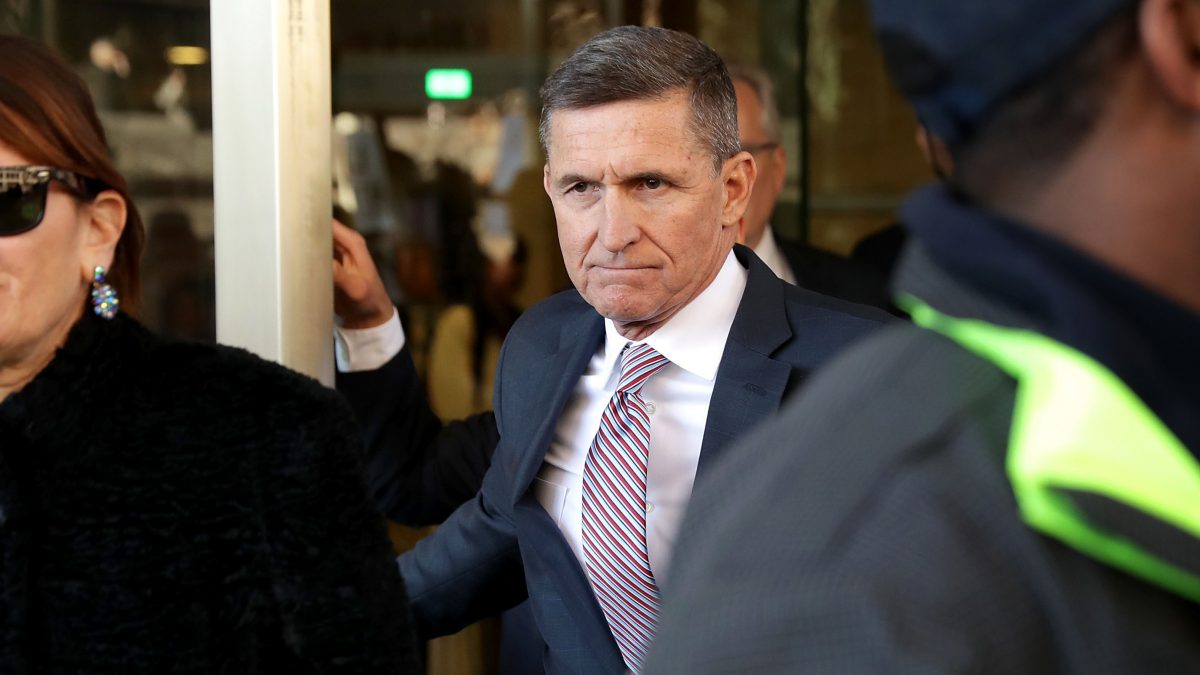
Oral arguments on former National Security Advisor Michael Flynn’s writ of mandamus request concluded Friday afternoon. The general consensus from legal experts appears to be that Flynn’s legal defense team and the Department of Justice didn’t make persuasive enough arguments to secure the writ of mandamus they are seeking.
The issue before a three-judge panel on the U.S. Circuit Court of Appeals for the District of Columbia is whether the panel should order the district judge presiding over Flynn’s criminal trial to grant the DOJ’s motion to dismiss the Flynn prosecution.
The crux of the controversy is whether Rule 48(a) of the Federal Rules of Criminal Procedure, which states that states that “[t]he government may, with leave of court, dismiss an indictment, information, or complaint” (emphasis added), grants U.S. District Judge Emmet Sullivan the authority to examine the reasons behind the DOJ’s decision to drop the case against Flynn, who twice admitted he was guilty of lying to the FBI.
While the consensus among most court-watchers was that the D.C. Circuit would be more than reluctant to order Sullivan to dismiss the case before he had issued an actual decision on the matter, it appears Flynn’s attorney Sidney Powell and the DOJ did not do much to change that perception.
Powell, who replaced Flynn’s legal counsel after he had already pleaded guilty, was heavily criticized for her argumentation before the Court.
Georgetown University Law Center professor Marty Lederman said that Powell kept making arguments that had no bearing on whether or not Sullivan has the authority to deny the DOJ’s motion. He called this “performing for Fox News.”
“Sidney Powell might be skilled at some things, but having a coherent appellate argument apparently isn’t one of them. The court of appeals should make quick work of this petition,” Lederman wrote. “The stuff Powell is citing now–e.g., purported Brady violations–isn’t part of the government’s Rule 48(a) motion, FWIW. What she’s doing now is performing for Fox News, not trying to persuade the panel.”
“She has no idea what she’s doing, and the panel realizes it. They should let her sit down and see if the Deputy SG has a more serious argument. But I suppose it’s worth getting her to make all these concessions that completely undermine her petition,” he added.
Georgetown University Law professor and former Senior Director for Counterterrorism at the National Security Council Joshua Geltzer said Powell’s argument could be summarized as “Don’t let the facts come out about why DOJ flipped,” “Don’t let the trial judge ask questions,” “Don’t even let him think about it,” “Just–quickly, quietly–make this all go away. NOW.”
MSNBC and NBC legal analysts similarly went after Powell.
Former federal prosecutor Glenn Kirschner said Powell had made “shameful” arguments.
“Very upsetting that Flynn’s lawyer just said the FBI always shows interviewees the evidence they have BEFORE interviewing them (‘they do it all the time’). That is demonstrably and inarguably untrue. Shameful,” he said.
Kirschner also took umbrage with the Powell and DOJ’s overall position in the case.
“To be clear, Flynn’s lawyers are arguing that even if there’s clear, overwhelming evidence that Barr is corruptly trying to dismiss Flynn’s case, the Judge, the courts and, by extension, the American people, just have to live with it. Tough luck, America,” he said.
Former U.S. Attorney and current MSNBC/NBC legal analyst and University of Michigan Law professor Barbara McQuade also highlighted Powell’s “exculpatory evidence” arguments, but saved most of her criticism for the DOJ.
“[Powell] keeps saying ‘exculpatory evidence.’ There is none. Musings and opinions of agents do not negate Flynn’s guilt of lying to FBI. Recordings prove that,” McQuade wrote.
McQuade then took aim at Principal Deputy Solicitor General Jeffrey Wall, who she said consistently cited to a particular case that did not help his argument.
“Get the hook for DOJ atty Wall in Flynn case. He keeps relying on Fokker Services case. As Judge Henderson said, [U.S. v. Fokker Services] is distinguishable,” she wrote.
“Wall says Fokker Services requires district court to dismiss Flynn case without further review, but that case said courts presume prosecutors have properly discharged duties ‘in the absence of clear evidence to the contrary.’ Clear as a bell here,” she wrote in explaining the difference.
She also criticized Wall’s argument that allowing the case to continue would create a “spectacle.”
“DOJ atty Wall asks for mandamus in #Flynn case us to avoid “spectacle”. That’s rich. AG Barr is trying to dismantle to work of the Special Counsel with disingenuous arguments to benefit an ally of the president. That’s the spectacle,” McQuade continued.
Overall, Lederman, Kirschner, McQuade were in agreement that a granting of mandamus was not in the cards. The court did not seem inclined to grant this extraordinary remedy in advance of a ruling from Sullivan.
That sentiment was echoed by former acting U.S. Solicitor General Neal Katyal, who wrote, “Bottom line is it is going very poorly for [Donald] Trump and Michael Flynn.”
[image via Chip Somodevilla/Getty Images]